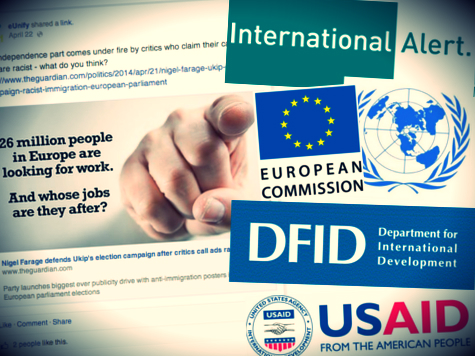The European Commission is pumping propaganda money into Britain, trying to interfere in the elections to the European Parliament.
International Alert, an international “peace building” group set up in 1986 in response to ethnic conflict and genocide in Asia and Africa, and part-funded by the EU, has now set up a propaganda operation in Britain which claims it will “counter racist and xenophobic discourse in the UK in the run-up to the European elections.”
The reference is thought to be a veiled reference to Nigel Farage’s UK Independence Party (UKIP), as many europhiles and left-wing organisations refer to the eurosceptic party as “racist” or “xenophobic”.
The aim of the operation appears to be at British politics, since the group is advertising on a jobs website, w4mpjobs.com, which is meant to help people finds jobs with MPs, or “obtain the sort of experience they would need to get a job in parliament” or help those already in Parliament “to progress their career.”
International Alert is offering a short term job starting “immediately,” and finishing after the elections at the end of May. Applicants must be social network enthusiasts who can “disseminate messages and materials” and “mobilise campaigns.”
The social media propaganda campaign is funded by the Open Society, an organisation established by the billionaire George Soros, whose aim is for nations to surrender ever more power to global organisations.
International Alert recently launched its “eUnify” campaign on Twitter, which has a paltry 72 followers, and tweets parodies of UKIP posters, and pushes propaganda efforts of anti-UKIP organisations such as ‘Show Racism the Red Card’.
Further details on the propaganda job are offered on the group’s website, but on a page blocked for anyone not authorised by International Alert. The website does not disclose the total amount of funds the group receives from EU institutions, and a request by Breitbart London for information was unsuccessful.
A spokesman for International Alert told said, “we don’t have the figures” on their total funding from the EU, and it could take “several days” to put the figures together. However, the spokesman said that “We would never take sides” in the European Parliament elections, and theirs is “a non-political campaign.”
Observers of EU operations cannot be surprised to find Brussels interfering in internal politics again. Despite the repeated insistence in Brussels by eurocrats that “it has been the long standing policy of the European Commission not to interfere in internal elections or referenda in Member States,” EU officials have a long history of spreading pro-EU propaganda at politically sensitive moments.
When confronted on this issue, the commission’s policy is that the provision of “information” is not intended “to influence political decisions or electoral contests.” But as long ago as 2008, a study by the Open Europe think tank found that eurocrats in the commission’s multi-billion euro propaganda machine admit: “Neutral factual information is needed of course, but it is not enough on its own.”
At that time, after months of research, Open Europe calculated that the annual propaganda budget for the European Commission was €2.4bn “at the very least.”
A 2014 mission statement by the key players in EU propaganda, the directorate general of communications at the commission, says the number one key performance indicator of the success of their communications “objectives” is “the percentage of citizens now feeling European.”
In 2013, Robert Oulds, the director of the Bruges Group eurosceptic think tank, listed dozens of EU propaganda sources in his book, Everything You Wanted to Know About the EU. Among them are the Centre for European Policy Studies, Pour la Solidarité and Friends of Europe, “each receiving the bulk of their funding from the European taxpayer.”
In 2011 alone, Oulds says, “the budget for the commission’s Civil Society Contact Group amounted to more than €3m” and made up the bulk of each organisation’s funding to which the commission’s group made grants.
International Alert is also funded by British taxpayer money from the Department for International Development, and by a number of other public-funded organisations such as the Australian government, the British Council, the Norwegian government, the Swedish government, the United Nations, the UK Foreign and Commonwealth Office, and indeed the United States government.

COMMENTS
Please let us know if you're having issues with commenting.